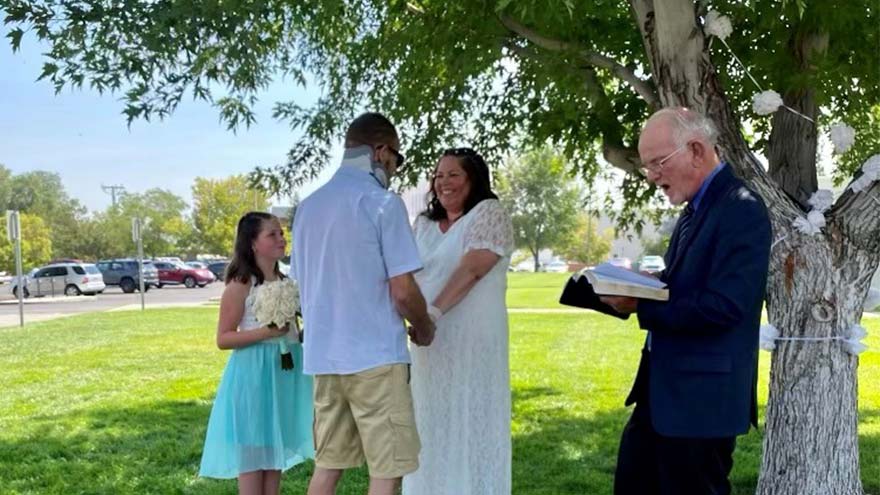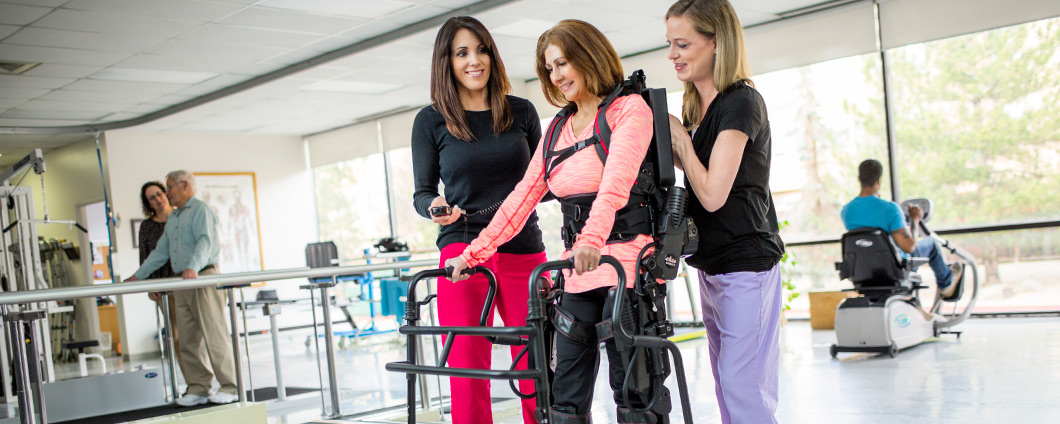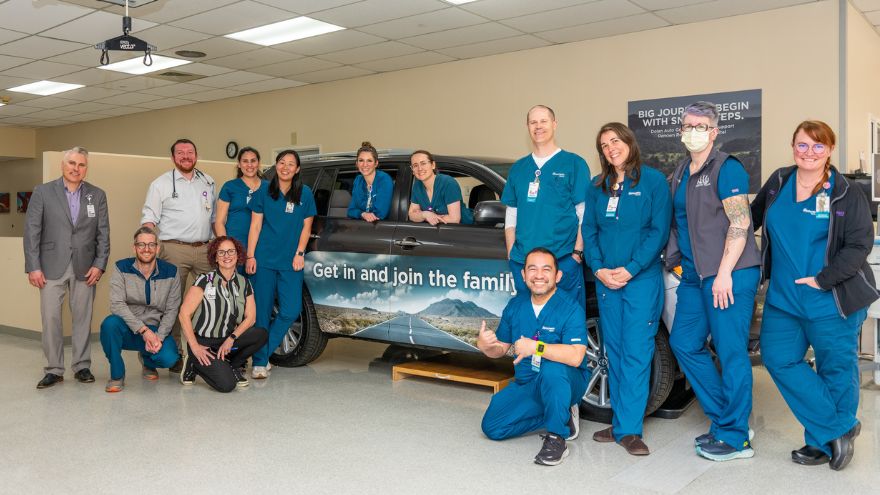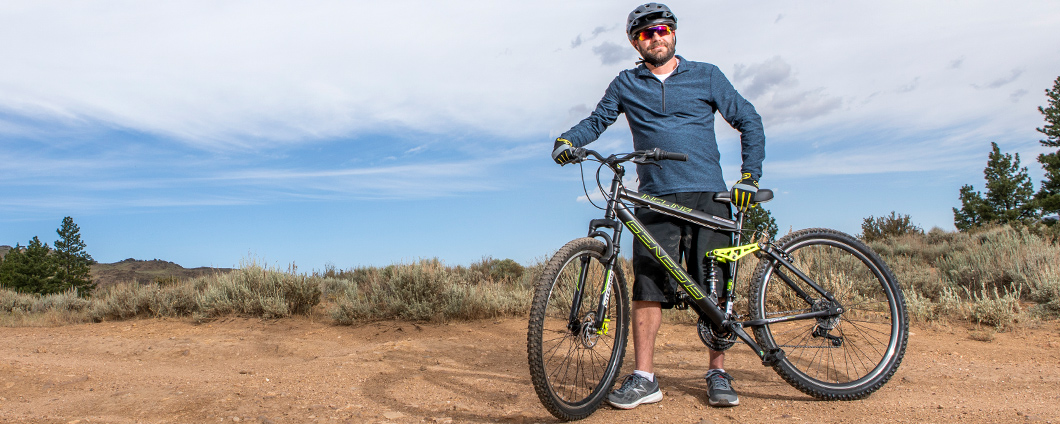Search
Results for 'neurology'
Clear-
Renown Neuro Diagnostic Laboratory Nationally Recognized
Earning its third five-year accreditation, Renown’s neuro-diagnostic lab remains Nevada’s only accredited ABRET facility. The Renown Institute for Neurosciences is pleased to announce that the neuro-diagnostic lab at Renown Regional Medical Center has been re-accredited by the American Board of Registration of Electroencephalographic and Evoked Potential Technologists (ABRET). ABRET’s lab accreditation process evaluates technical standards, the quality of a laboratory’s output, and lab management. “Renown Health is a leader and a destination for health in treating neurological disorders and advancing innovations in neurology. The specialists at the Renown Institute for Neurosciences provide comprehensive brain, nerve and surgical support along with a full range of diagnostic and additional procedures and a disease-specific, patient-focused approach to care,” says Tony Slonim, MD, DrPH, FACHE, President and CEO, Renown Health. “This prestigious honor from ABRET means Renown’s Electroencephalogram (EEG) Laboratory has met strict standards and is recognized as a place where patients and physicians can confidently receive quality diagnostics.” “In addition to re-accreditation from ABRET, the Institute for Neurosciences has earned a Gold Seal of Approval by the Joint Commission and offers advanced treatment options including t-PA (Tissue Plasminogen Activator) and biplane angiography. The Level III accredited Epilepsy laboratory implements some of the newest treatments available,” said Renown’s Chief Medical Officer, Paul Sierzenski, MD, MSHQS, CPE, FACEP. “Renown patients also have access to the most promising new therapies through national clinical trials, which have been shown to significantly improve patients’ health and well-being.” “I am proud to recognize our dedicated team of caregivers for their continued passion and excellence in maintaining the highest standards in patient care,” said Renown Institute for Neurosciences’ Division Chief, Dr. Rolando Ania. “It is all thanks to their tremendous efforts that we remain the only ABRET accredited laboratory, as well as the only nationally accredited epilepsy center (NAEC Level III), in the state of Nevada.” Using a collaborative approach, specialists at the Renown Institute for Neurosciences use leading-edge diagnostic tools to identify neurological conditions and treat patients with the most effective techniques available. What is a Neuro-diagnostic Lab? A neuro-diagnostic lab allows care teams the technology to evaluate how a patient’s peripheral, autonomic, and central nervous systems function, and aid in diagnosing and treating conditions such as epilepsy, multiple sclerosis, Parkinson’s disease, stroke, and other diseases of the nervous system. What is an Electroencephalogram (EEG)? An Electroencephalogram (EEG) is a test that measures and records the electrical activity of the brain. During the test, special sensors called electrodes are attached to the patient’s head and hooked by wires to a computer. The computer then records the brain’s electrical activity on the screen. Using a collaborative approach, specialists at the Renown Institute for Neurosciences use leading-edge diagnostic tools to identify neurological conditions and treat patients with the most effective techniques available. Renown Health hospitals are ranked as Nevada’s top hospitals by U.S. News & World Report.
Read More About Renown Neuro Diagnostic Laboratory Nationally Recognized
-
Love Endures: A Remarkable Recovery Leads to a New Future
It’s true that a road trip can change your life, and it did for Sergeant Brandon Ott, just not in the way he was expecting. For nine years, Brandon worked alongside his friend, Denton Tipler, at the police department in Florence, Oregon. To break the monotony of the COVID-19 lockdown, they planned a ‘guy’s trip’ - a pandemic safe, motorcycle adventure traveling through Idaho and Washington. On the morning of July 22, 2020, they set out on their journey. But by 8 p.m., they ran into rough weather - with wind, poor visibility and heavy rain as they rode into Nevada. Four miles from their destination, on a desolate stretch of Highway 140, a gust of wind hit Brandon. Denton watched in disbelief as his friend bounced, tumbled and ultimately came to a stop after sliding over 100 yards. He flagged down the next vehicle, a semi-truck, and the driver did traffic control while another passerby drove to get cell service and call 911. A Distressing Call About 10 p.m. the same night, Angie Brog, Brandon’s partner, picked up her phone at the Florence police station. A Nevada highway patrolman let her know Brandon was in a motorcycle accident and had been taken to a hospital in Winnemucca, NV. From there he took a life flight to Renown Regional Medical Center. Angie immediately called Brandon’s parents and told Addison, their 9-year-old daughter, the news. They quickly packed their bags and drove to Nevada. On the drive to Reno, an ER doctor called Angie to give her Brandon’s status, “I can’t thank him enough. I was so worried. He even gave me his personal cell phone number.” Upon arrival, she ran to see Brandon in the trauma ICU. “His face was shattered, he had a collapsed lung, a tube was down his throat and something was in his head to relieve pressure from his swelling brain,” she remembers. “He was not expected to live.” While Brandon was in a coma for three days, Angie was by his side, trying to come to grips with a new normal. “The doctors did not sugarcoat it,” she recalls. “They told me to prepare myself if he pulled through.” It was a rough week in the ICU with Brandon heavily sedated, so he could heal. From there he was transferred to the neurology floor, where he slowly improved. While there, his daughter Addison got to see him for the first time. Angie says, “When Addison saw her daddy for the very first time, she was relieved, happy she could hug him, and that he was alive.” Miraculously his legs were not broken and he was able to hold simple conversations and walk a few steps. As the days went on, Brandon’s dad returned to Oregon, and the Inn at Renown became the family’s new home. “It was such a blessing to be so close to Brandon,” Angie observes. “It allowed us to relax a little being in the same building and let us settle in.” The Comeback Brandon’s first memory after the accident was waking up in the Renown Rehabilitation Hospital, 16 days after his accident, not knowing where he was. (Brandon experienced amnesia due to his brain injury and doesn’t remember the days prior to his rehab stay.) He recalls looking around the hospital room and seeing the photos Angie posted of their family on the walls and wondering, “How did they get pictures of my family?” Immediately after learning that Brandon was awake, Angie raced back to the hospital, went outside his window and talked to Brandon on the phone, reassuring him that they were there for him and everything was going to be ok. The next morning, he saw Addison for the first time that he remembered since his accident. They each put their hands to the hospital window “touching” each other in an emotional reunion. During the pandemic, each rehab hospital room was designated with an animal, so family and friends could visit outside safely. Brandon was in the ‘moose’ room. “Whoever thought of that was a genius,” notes Brandon. A new phase of Brandon’s recovery began at the rehab hospital. "He worked so hard while he was there,” Angie shares. With a minimum of three hours of daily therapy sessions, including speech, occupational and physical therapy. Angie participated in every aspect of his therapy, “I learned so much from the therapists; they included me in everything,” she recalls. “The compassion and patience they have is amazing. It takes a special type of person to do this job. I cannot say enough good things about the Renown Rehabilitation Hospital staff. If he would have been anywhere else, I’m not sure he would be alive,” she says. It wasn’t easy. Brandon had a brain injury that required a bolt in his skull to relieve the pressure, and a broken left collar bone and left eye socket. His entire face had to be reconstructed. He remembers his face hurting and thinking he looked like Freddy Krueger. When he saw himself in the mirror for the first time, he was surprised to find he only looked thinner, with a gauze pad on his temple. Prior to the accident, Brandon weighed 300 pounds, but had just finished a year-long fitness journey losing 119 pounds, by doing CrossFit and overhauling his diet. During rehab his weight dropped to 160 pounds and he was known as “the double portion” guy, eating extra food to gain weight. Shaun Stewart, Therapeutic Recreational Therapist, recalls Brandon riding the recumbent cycle during his recovery. “I remember him saying he didn’t know if he was ever going to be able to ride a bike again and was appreciative when adaptive sports were discussed. He was very willing to participate and excited to be able to get on a bike again. He had a positive attitude and always was willing to get up and get back on the bike.” Better Together Although Angie and Brandon were in a committed relationship for almost 11 years, they were not legally married at the time of his accident. “In our minds, our lives were perfect,” Angie asserts. “We had lived together for so long and have a child together.” However, because of COVID-19 restrictions, Angie had to lie and tell the medical staff that they were married so she could be by his side. When Brandon woke up from a coma, she told him, “No matter what I’m your wife.” He asked, “What do you mean, you are my wife?” After hearing Angie’s explanation, Brandon said, “Then, let’s do it.” “We realized when faced with death that the benefits far outweighed the negatives in becoming husband and wife,” Angie discloses. “The rest is history.” On Tuesday, August 18, 2020, Brandon and Angie were married underneath the trees behind the rehab hospital. Their family, friends and several staff members attended the ceremony. “I think that’s a first for us,” declares Dr. Gavin Williams. “I cleared him for capacity to make decisions, and we had a COVID-friendly wedding on our back lawn before he went back home to Oregon.” The next day, Brandon officially left the hospital. “I felt good. Like ‘he’s gonna make it,’ but I was also scared,” mentions Angie. The family stayed in town for a couple of days to make sure everything was ok and then traveled home to Oregon.
Read More About Love Endures: A Remarkable Recovery Leads to a New Future
-
Renown Health is Nationally Recognized for Its Commitment to Providing High-Quality Stroke Care
The American Heart Association presents Get With The Guidelines®-Stroke Gold Plus award for proven dedication to ensuring all stroke patients have access to best practices and life-saving care. Renown Health has received the American Heart Association’s Get With The Guidelines®-Stroke Gold Plus with Target: Stroke Honor Roll Elite Plus with Target: Type 2 Diabetes Honor RollGet With The Guidelines® - Stroke quality achievement award for its commitment to ensuring stroke patients receive the most appropriate treatment according to nationally recognized, research-based guidelines, ultimately leading to more lives saved and reduced disability. Stroke is the No. 5 cause of death and a leading cause of disability in the U.S. A stroke occurs when a blood vessel that carries oxygen and nutrients to the brain is either blocked by a clot or bursts. When that happens, part of the brain cannot get the blood and oxygen it needs, so brain cells die. Early stroke detection and treatment are key to improving survival, minimizing disability and accelerating recovery times. Get With The Guidelines puts the expertise of the American Heart Association and American Stroke Association to work for hospitals nationwide, helping ensure patient care is aligned with the latest research- and evidence-based guidelines. Get With The Guidelines - Stroke is an in-hospital program for improving stroke care by promoting consistent adherence to these guidelines, which can minimize the long-term effects of a stroke and even prevent death. Renown Health is committed to improving patient care by adhering to the latest treatment guidelines,” said Thomas Graf, MD, FAAFP, Renown Health Chief Executive Officer. “Get With The Guidelines makes it easier for our teams to put proven knowledge and guidelines to work on a daily basis, which studies show can help patients recover better. The end goal is to ensure more people in northern Nevada can experience longer, healthier lives.” Each year, program participants qualify for the award by demonstrating how their organization has committed to providing quality care for stroke patients. In addition to following treatment guidelines, Get With The Guidelines participants also educate patients to help them manage their health and recovery at home. “We are incredibly pleased to recognize Renown Health for its commitment to caring for patients with stroke,” said Steven Messe, MD, chairperson of the Stroke System of Care Advisory Group. “Participation in Get With The Guidelines is associated with improved patient outcomes, fewer readmissions and lower mortality rates – a win for health care systems, families and communities.” Renown Health also received the American Heart Association’s Target: Stroke Honor Roll Elite Plus award. To qualify for this recognition, hospitals must meet specific criteria that reduce the time between an eligible patient’s arrival at the hospital and treatment with the clot-buster alteplase. Renown Health also received the American Heart Association’s Target: Type 2 Honor Roll award. Target: Type 2 Diabetes aims to ensure patients with Type 2 diabetes, who might be at higher risk for complications, receive the most up-to-date, evidence-based care when hospitalized due to stroke. About Renown Health Renown Health is the region’s largest, locally governed, not-for-profit integrated healthcare network serving Nevada, Lake Tahoe and northeast California. With a diverse workforce of more than 7,000 employees, Renown has fostered a longstanding culture of excellence, determination and innovation. The organization comprises a trauma center, two acute care hospitals, a children’s hospital, a rehabilitation hospital, a medical group and urgent care network, and the region’s largest, locally owned not-for-profit insurance company, Hometown Health. Renown is currently enrolling participants in the world’s largest community-based genetic population health study, the Healthy Nevada Project®. About Get With The Guidelines® Get With The Guidelines® is the American Heart Association/American Stroke Association’s hospital-based quality improvement program that provides hospitals with the latest research-based guidelines. Developed with the goal of saving lives and hastening recovery, Get With The Guidelines has touched the lives of more than 12 million patients since 2001. For more information, visit heart.org.
-
Know Before You Go
Grab your skis, goggles, coat – and don’t forget that helmet. Skiing and snowboarding are fun activities for all ages but come with the risk of injury. Read on for tips to make it a safe day on the mountain. Daydreaming about your next trip to the slopes? We talked to Jared Worchel, DO, about his top tips for gearing up. Get the Gear Before you head out to ski or snowboard, make sure you have all your gear ready and in good condition. Everything should fit correctly so that it keeps you as safe as possible. Wearing proper gear will also help keep you warm. Items to check on before you head out include: Boots Bindings Goggles Poles Helmet Outwear Gloves Pack water and snacks in case the drive takes longer than you except due to weather or traffic. You’ll also want to make sure that your cell phone is fully charged before you head out in case you need to contact friends of staff for help while on the mountain. Helmet, Helmet, Helmet Having a helmet that fits correctly is the most important thing you can do to prepare for a safe day on the mountain. According to a National Ski Areas Association study, helmet use has increased over the last 15 years, with 80 percent of skiers and snowboarders using helmets. Schubert would like to see that number increase to 100 percent. “If you have a head injury it could take you out for the rest of your life,” Dr. Worchel said. “The most important things to think about when fitting a helmet are making sure that it really fits you appropriately. You want to go into a store and try on as many different helmets as they have available. I know it’s tempting to buy one online, but you’re never going to know if it fits correctly.” If you are in an accident, your helmet’s fit can help protect you. Dr. Worchel has some tips on fitting: A helmet should fit low and snug over the head. Make sure that the helmet doesn’t wiggle or feel loose. Look for a model that has adjustability in the back, which will help you make sure it fits snugly. F ind a helmet with a chin strap that will help it stay in place throughout the day.
-
Women and Stroke Surprising Signs to Know
Stroke is unfortunately common, with 1 in 5 American women experiencing it each year. When it comes to a stroke the phrase “time is brain” speaks to the urgency of getting rapid care. In fact, a woman may lose nearly 2 million neurons per minute of oxygen loss to the brain. The Renown Health Comprehensive Stroke Center experts share the importance of timely treatment and how stroke symptoms can differ in women. Women and Stroke – Surprising Symptoms Each year stroke affects more women than men. Even more concerning, women are less likely to recover from a stroke. The following non-traditional, less common, warning signs can be common in women: Hiccups with chest pain Sudden disorientation, drowsiness, confusion or a general altered mental status Nausea or vomiting A sudden headache that feels like the ‘worst headache of your life’ Unusual chest pain (especially with hiccups) Body numbness or weakness, such as an arm or leg suddenly ‘falling asleep’ Fainting or loss of consciousness Stroke Diagnosis The first step is neuroimaging by CT scan. This allows for rapid identification of any bleed, and also assists in determining candidacy for the early clot busting medication. MRI brain imaging is much higher resolution, and can better determine the core stroke size, assisting in prognosis and recovery. Since strokes have several different origins, an inpatient workup is essential to determine the underlying cause. Whether the stroke is secondary to plaque in the large vessels, clots being thrown in the setting of atrial fibrillation (an abnormal heart rhythm), or small vessel disease from years of uncontrolled vascular risk factors (high blood pressure, smoking, high cholesterol, diabetes), determining the cause is essential to implementing a management plan to reduce risk for further strokes. Quick Treatment for Stroke is Key Early recognition of stroke symptoms and seeking prompt attention is paramount. There are interventions that can be instituted to minimize the stroke and increase likelihood of recovery, but only if a patient presents to the hospital early. A clot busting medication, called tPA, can be given to patients with stroke if given within 4-5 hours from time of onset. Renown Regional Health Center is designated as a Comprehensive Stroke Center, the highest level of stroke certification available. To earn the designation of comprehensive stroke center, a hospital has to meet stringent requirements, including biannual on-site evaluations. This includes care for ischemic stroke patients (lack of blood flow), hemorrhagic stroke patients (bleeds), and determining the underlying cause to guide secondary stroke management prevention. Stroke Symptoms Remember “B.E.F.A.S.T.” to recognize the symptoms of a stroke below: B – Balance Being off balance or dizzy, is common. E – Eyes An eyesight change such as blurring or double vision may occur. F – Face droop One side of the face, or lip, droops A – Arm weakness Does one arm drift down? S – Speech Talking may slur or sound strange. T – Time Time to call 911. Call an ambulance immediately if you or anyone else, experiences any of these symptoms.
-
Are Blue Light Glasses Necessary?
Since the COVID-19 pandemic, more people are working from home than ever before, leading to a rise in digital screen time. Between spending eight or more hours staring at a computer screen, and some downtime hours spent looking at a smartphone or watching TV, it’s almost inevitable to feel some adverse effects at the end of a day. Blue Light Effects vs. Digital Eye Strain Blue light is all around us, and the most natural source comes primarily from sunlight. Other forms of blue light are artificial and emitted by digital screens including LED TVs, smartphones, tablets and computers. Surprisingly enough, research shows blue light can actually have health benefits such as promoting alertness, boosting memory and cognitive function, elevating mood and regulating circadian rhythm. However, studies indicate that an excess in blue light exposure can lead to depletion of melatonin production, a hormone that regulates our sleep cycles. In today’s eyewear industry, blue light glasses are one of the more popular items purchased by consumers. Companies who sell the glasses claim they help with reducing or eliminating digital eye strain, while also increasing natural melatonin secretion to get a good night’s sleep. Other than their slight yellow tint to filter out blue light, they mostly look like regular glasses and come in many different stylish frames. You can find blue light glasses through various eyewear retailers. Most adults have experienced digital eye strain. Common symptoms of digital eye strain include headaches, blurred vision, irritated eyes, and fatigue. Many believe that digital eye strain is caused by overexposure to blue light, but medical vision experts say that is not the case. “Digital eye strain is related to how we use our digital devices, not the blue light coming out of them,” says Mitchell Strominger, MD, a neuro and pediatric ophthalmologist with Renown Health. Do Blue Light Glasses Even Work? Since blue light glasses aren’t medically proven to help with digital eye strain, you’re probably wondering if they’re even worth using. “If you’re one to binge a TV show or scroll though social media before bedtime, the blue light from those digital screens can disrupt your circadian rhythm and cause you to lose sleep, which can ultimately lead to other adverse health effects,” says Dr. Strominger. “While more research is still needed, some studies have shown that blue light glasses may prevent melatonin suppression and increase quality of sleep. There is no harm in trying them out and seeing if they work for you.” As for preventing digital eye strain, Dr. Strominger shared several helpful tips: Try using the 20-20-20 rule, which entails looking away from your screen and looking at an object 20 feet away for at least 20 seconds. Sit at an arm’s length (about 25 inches) away from your screen. Adjust the brightness and contrast of your screen, especially before bedtime. There is a night mode setting on most smart phones you can use. Reduce your screen time whenever you can and give your eyes a break.
-
Physiatry NEURO-REHABILITATION CLINIC
What is Physiatry? Physiatry (fuh·zee·a·tree) encompasses the diagnosis, prevention and treatment of all disabilities related to the brain, nerves, bones and muscles. The goal is to maximize physical functioning, significantly decrease or eliminate pain, foster independence and improve the quality of life for those with a disability, chronic pain and physical impairments.
-
Renown Health Nationally Recognized for Commitment to Providing High-Quality Stroke Care With Three American Heart Association Recognitions
The American Heart Association presents Get With The Guidelines®- Stroke Gold Plus awards for proven dedication to ensuring all stroke patients have access to best practices and life-saving care. Renown Health emergency, medical and surgical providers have received three American Heart Association’s Get With The Guidelines® awards. These awards demonstrate commitment to ensuring stroke patients receive the most appropriate treatments according to nationally recognized, research-based guidelines; reducing disabilities and increasing the number of lives saved. Every 40 seconds, someone in the U.S. has a stroke. Stroke is the 5th leading cause of death in the U.S. and the main cause of adult disability. Studies show patients recover better when providers consistently follow treatment guidelines. Get With The Guidelines puts the expertise of the American Heart Association and American Stroke Association to work for hospitals nationwide, helping ensure patient care is aligned with the latest research and evidence-based guidelines. “A stroke is an extremely serious condition that requires emergent medical treatment. The faster treatment is provided, the lower the risk of brain injury. We are proud of our thousands of physicians, nurses and clinicians who consistently practice exceptional patient care by adhering to the latest treatment guidelines,” said Brian Erling, MD, MBA, President and CEO, Renown Health. “Get With The Guidelines makes it easier for our teams to put proven knowledge and consistent protocols to work on a daily basis, which studies show can help people live longer and better lives.” “As a participant in Get With The Guidelines programs, Renown qualified for the awards by demonstrating that physicians and clinicians across our integrated health system are committed to improving quality care for stroke patients,” said Bill Plauth, MD, MMM, CPE, Chief Medical Officer for Renown Health and Associate Dean for Clinical Affairs at the University of Nevada, Reno School of Medicine. “If you or a loved one is experiencing a stroke, call 911, as you need skilled medical care immediately. Stroke care focuses on helping people recover as much function as possible and return to independent living. The Renown Neurovascular and Stroke Program and Renown Rehabilitation Hospital teams provide expert emergency stroke care and comprehensive neurovascular care and rehabilitation services.” “We are pleased to recognize Renown Health for its commitment to caring for those in their community who need cardiovascular care,” said John Warner, MD, FAHA, past president of the American Heart Association and CEO of The Ohio State University Wexner Medical Center. “Hospitals that follow the American Heart Association’s quality improvement protocols often see improved patient outcomes, fewer readmissions and lower mortality rates – a win for health care systems, families and communities.” “Renown Regional Medical Center is the only designated Comprehensive Stroke Center in northern Nevada,” says Benjamin Pence, DO, Director, Institute for Neurosciences at Renown. “This means that we have the highest level of certification to receive and treat the most complex stroke cases. Our Institute for Neurosciences team is led by the area's top neurologists, and we conduct research studies involving new ways of preventing, diagnosing, and managing neurological disorders. We care for patients suffering from nerve and brain disorders due to stroke, headache, epilepsy, and other acute causes. We also monitor and develop treatment options for patients with memory and movement disorders such as Alzheimer’s, Parkinson's Disease or Multiple Sclerosis.” Renown Health also received the American Heart Association’s Target: Stroke Honor Roll Elite award. To qualify for this recognition, hospitals must meet specific criteria that reduce the time between an eligible patient’s arrival at the hospital (within 60 minutes or less) and treatment for at least 85 percent of applicable patients. “It is an honor to be among the American Heart Association’s Stroke Honor Roll Elite award recipients,” said Bret Frey, MD, president of Northern Nevada Emergency Physicians Care teams at Renown Health. “We adhere to these rigorous guidelines daily and demonstrate our unwavering commitment to ensuring more people in northern Nevada receive leading emergency and trauma care and the gift of extended, healthier lives.” Renown Health also received the American Heart Association’s Target: Type 2 Diabetes Honor Roll - Stroke award. Target: Type 2 Diabetes aims to ensure patients with Type 2 diabetes, who might be at higher risk for complications, receive the most up-to-date, evidence-based care when hospitalized due to stroke. This award is given to hospitals that qualify for the silver level or higher achievement award within the Get With The Guidelines – Stroke program and achieve an overall Diabetes Cardiovascular Initiative Composite Score of more than 80 percent. About Renown Health Renown Health is Nevada’s largest, not-for-profit integrated healthcare network serving Nevada, Lake Tahoe, and northeast California. With a diverse workforce of more than 7,000 employees, Renown has fostered a longstanding culture of excellence, determination, and innovation. The organization comprises a trauma center, two acute care hospitals, a children’s hospital, a rehabilitation hospital, a medical group and urgent care network, and the locally owned not-for-profit insurance company, Hometown Health. To join the Renown team, visit renown.org/careers. About Get With The Guidelines Get With The Guidelines® is the American Heart Association/American Stroke Association’s hospital-based quality improvement program that provides hospitals with the latest research-based guidelines. Developed with the goal of saving lives and hastening recovery, Get With The Guidelines has touched the lives of more than 12 million patients since 2001. For more information, visit heart.org.
-
Tariqs Journey of Resilience at Renown Rehab
Pictured above are members of the interdisciplinary team at Renown Rehabilitation Hospital, representing the diverse array of caregivers who supported Tariq's recovery journey. For Tariq Kuraishy and his wife Melissa, the focus is on his journey and getting back to life as he knew it rather than the stroke he experienced in June 2024, which led him to Renown Regional Medical Center and later to Renown Rehabilitation Hospital (otherwise known as “Renown Rehab”). From the swift assessment by first responders to the immediate treatment at Renown Emergency Room and the critical care received in Renown's Intensive Care Unit (ICU), Tariq’s journey has been marked by resilience and exceptional support beyond the couple’s expectations. Navigating the First Moments After Stroke Melissa shared how Tariq’s care team’s calm demeanor and expertise eased the initial shock of his diagnosis, treatment and plan of care. For Melissa, staying informed during crucial care discussions was vital. She noted that the team's professionalism and reassurance gave her the confidence to let go of some of the mental and emotional burden she felt during the immediate period after the stroke, allowing her to focus on both her and Tariq's physiological and emotional needs. “I felt very safe being at Renown, knowing that we were being cared for to the greatest extent,” said Melissa. Rising to His Personalized Rehabilitation Plan Tariq began the Renown Rehab program on June 19 with one goal in mind: to regain 70% of his brain function within 30 days. To achieve this, he spends four to five hours per day participating in physical, occupational, speech and recreational therapies as part of a comprehensive rehabilitation program tailored to his specific needs. If that sounds like a rigorous schedule, it's because it is, but Tariq prefers it that way because it means he’s actively working towards regaining his sense of normalcy with his care team alongside him every step of the way. “Unlike other places that might take a more lenient approach, the responsibility for progress not only lies with the Renown Rehab team but also the patient. If you are prepared to do the work, Renown Rehab is prepared to get you there,” Tariq said. Melissa emphasizes that Renown Rehab provides comprehensive, whole-person care with a variety of innovative, individualized therapies. These therapies keep patients engaged and busy throughout the day, addressing not just the affected areas but also the entire body and mind, ensuring holistic recovery and facilitating progress in unique ways. Activities like catching a ball or putting a ball in a hole help restore function, much like restoring power to a building that has lost electricity. It’s All About the Support and the Team’s Know-How From the moment he arrived, the Renown Rehab team has been continuously assessing Tariq’s abilities and tailoring his rehabilitation plan to propel him to the next level. Melissa, who spends up to 12 hours a day at the facility supporting her husband, highlighted the daily therapeutic sessions as an impressive way the care team evaluates Tariq’s readiness for more challenging tasks. Communication between the couple and Tariq’s team of doctors, nurses, therapists, techs and certified nursing assistants is constant as they actively involve them in decisions. As Tariq put it, they don’t cater to his comfort zone but instead push for progress, understanding it may not always be linear. It’s a true collaboration. “It doesn’t feel like it's being done to us but being done with us,” Melissa said. Looking Ahead Tariq and Melissa feel immensely fortunate to be at Renown Rehabilitation Hospital, which offers an exceptional blend of equipment, technology and expert care teams. “The Rehab facility is a treasure,” Tariq said. “Every member of the care team has displayed the utmost level of professionalism and expertise, and there hasn't been a single person who hasn't shown compassion and competence,” Melissa added. “I feel I will get the most out of being at Renown Rehab. I plan to take full advantage of the services and use every bit of the team’s talent, training and expertise. I will not leave anything on the table,” Tariq said. As Tariq continues to progress, he and Melissa are optimistic about the future. Tariq continues to receive physical, occupational and speech therapy at Renown Rehab. Their journey, marked by determination and strong support from Renown, offers hope to others facing similar challenges.
Read More About Tariqs Journey of Resilience at Renown Rehab
-
Spine, Sports and Pain Management
How We Can Help You may benefit from treatment for neuromuscular (nerve, muscle and bone) disorders – that cause pain and impair normal functions. But, first, consult your primary care physician for a referral to Renown Health's Spine, Sport & Pain Management. Dr. Keating, Medical Director and his colleagues, Dr. Su and Dr. Storm, will customize a treatment plan that best suits your needs and lifestyle while providing the most effective care possible. For more information: Call 775-982-3608 | Fax 775-982-8001
-
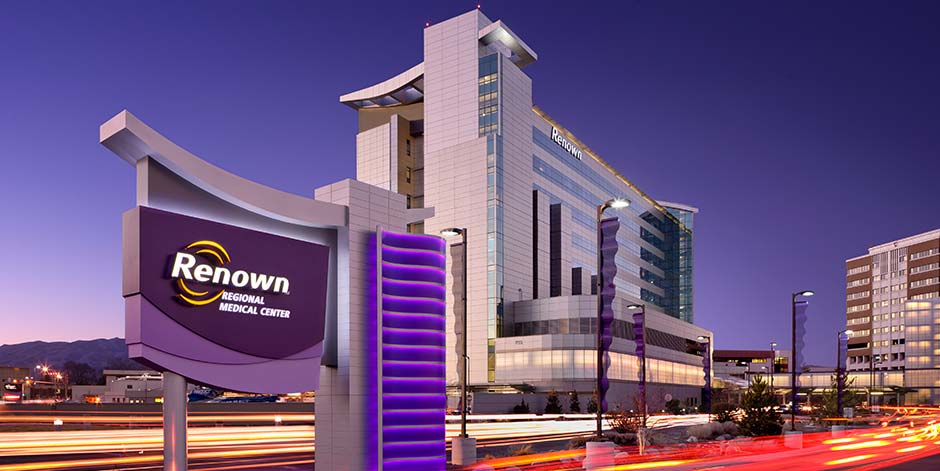 Renown Regional Medical CenterRenown Regional Medical CenterHours
Renown Regional Medical CenterRenown Regional Medical CenterHours
Open 7 days a week, 24 hours a day, 365 days a year -
Concussion Risks and Prevention
It’s important to be aware of the risk of a concussion, which can have serious health implications. Susan Park, MD, discusses the effects of concussions and how they can be prevented. According to Susan Park, MD, a Renown Medical Group doctor who specializes in sports and family medicine, concussions are a serious issue — especially among children whose developing brains “are more susceptible to brain injury and long-term effects from concussions.” All parents, coaches and athletes, she points out, should be aware of the risks of concussions and take precautions to avoid them. What is a concussion and how does it occur? Dr. Park describes a concussion as a traumatic brain injury resulting from direct or indirect impact to the head or body, during which the brain shakes back and forth in the skull. This may cause some bruising of the brain. In severe cases, traumatic head injuries can cause bleeding, which if not treated quickly, can be fatal. What are the health implications of a concussion? Symptoms of drowsiness and confusion can be a sign of a concussion after a head injury. Some short-term effects may include headaches, dizziness and difficulty concentrating. Long-term concerns can further include mood disorders, sleep disturbance and problems with cognitive function-concentration, which may affect school performance. What sports carry the highest risk of suffering a concussion? Dr. Park notes participation in any impact sport can result in a head injury. But among school-age kids, she treats more concussions from football and soccer than any other sport. However, during the winter months, skiing and snowboarding injuries can be a common cause of concussions Any blow to your head, neck or upper body can result in a concussion with symptoms including, but not limited to, feeling dazed or confused, dizziness, nausea/vomiting or a headache. Initial treatment of concussions varies depending on severity. Rest, avoiding vigorous activity and a reduced school workload help young athletes recover after a concussion. Dr. Park notes that sometimes further imaging and an ER visit will be required. Otherwise, rest from activities is the main treatment, along with not returning to sports activities until further clearance from a healthcare provider.

